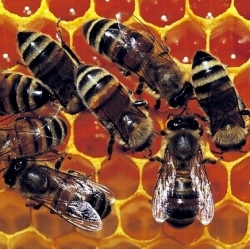
The vanishing of honeybees from hives can be directly linked to insectcide use, according to new research. The scientists showed that exposure to two neonicotinoids, the most widely used class of insecticide, lead to half the colonies studied dying, while none of the untreated colonies saw their bees disappear.
"We demonstrated that neonicotinoids are highly likely to be responsible for triggering ‘colony collapse disorder’ in honeybee hives that were healthy prior to the arrival of winter," said Chensheng Lu, an expert on environmental exposure biology at Harvard School of Public Health and who led the work.
The loss of honeybees in many countries in the last decade has caused widespread concern because about three-quarters of the world’s food crops require pollination. The decline has been linked to loss of habitat, disease and pesticide use. In December 2013, the European Union banned the use of three neonicotinoids for two years.
In the new Harvard study, published in the Bulletin of Insectology, the scientists studied the health of 18 bee colonies in three locations in central Massachusetts from October 2012 till April 2013. At each location, two colonies were treated with realistic doses of imidacloprid, two with clothianidin, and two were untreated control hives.
